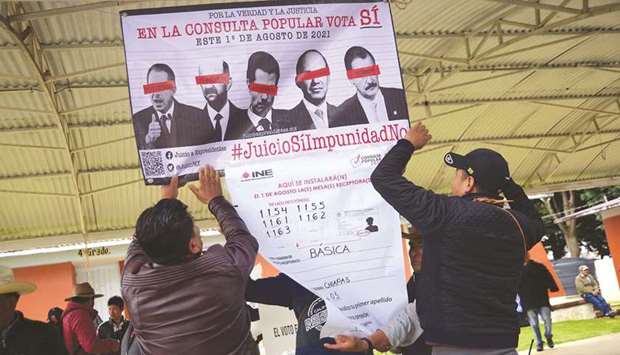A referendum backed by President Andres Manuel Lopez Obrador on whether to investigate Mexico’s former political leaders has fallen short of the required turnout though it had overwhelming backing from those who voted, initial results showed.
Mexico’s National Electoral Institute (INE) said that, according to a preliminary count of nearly 99% of ballots, 97.7% of participants supported the proposal of putting the decisions of previous political leaders under investigation.
Still, turnout for the referendum was just over 7%, far below the 40% threshold set to make it binding.
Speaking at his regular news conference, Lopez Obrador said that he was pleased with the outcome, arguing it marked the start of a practice that would become a “habit” for Mexican voters.
The INE set up around 57,000 ballot boxes, compared with more than 160,000 for June’s legislative and local elections, and carried out limited promotion activities, citing a lack of resources.
Lopez Obrador has repeatedly criticised the poll body, which rejected his accusations that it did not fully support the referendum.
“It’s not a matter of budget. It’s a matter of will,” the leftist president said. “They were not enthusiastic about this consultation and they have not been enthusiastic about democracy.”
He added that he would press ahead with plans to hold a referendum in March on whether he should stay in office until the end of his term, which is due to conclude on September 30, 2024.
Lopez Obrador has used plebiscites to overturn decisions by past governments.
The leftist leader has blamed former presidents Carlos Salinas, Ernesto Zedillo, Vicente Fox, Felipe Calderon and Enrique Peña Nieto, whose administrations extended from 1988 to 2018, for fuelling corruption, inequality and violence in Mexico.
None of them is known to be under investigation.
Sunday’s referendum asked voters to reject or back “a process of investigation of political decisions taken in past years by political actors” that would be aimed at “guaranteeing justice and the rights of possible victims”.
Lopez Obrador originally wanted the referendum to ask voters if they wanted the former presidents to be prosecuted, but Mexico’s Supreme Court ordered a broader formulation of the question to protect due process and the presumption of innocence.
Lopez Obrador said yesterday that his predecessors could still face prosecution despite the low turnout in the referendum.
“This does not rule out the possibility of trials,” said the president, who had championed Sunday’s referendum.
“The authority has the right at all time to act when it comes to judicial matters as long as there is evidence,” he told reporters, describing voter participation as “a triumph”.
In Mexico former presidents can be tried like any other citizen, and critics argued that the referendum was unnecessary.
Lopez Obrador said that “the important thing is that a democratic process was started so that no one feels untouchable”.

People from an indigenous community take part on Sunday in a referendum to decide whether to investigate five former leaders, at a polling station in Corazon de Maria, in Mexico’s Chiapas state.
